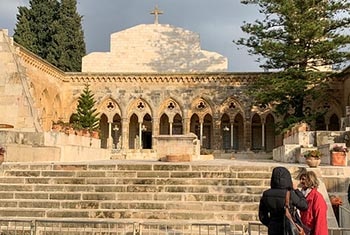January 10 to 15, 2020
Our theme for this Holy Land retreat in January was “The Meditation and Study of the True Life in God Messages” and to experience Christ’s life by journeying into the very same places that hold His footsteps. We lodged at the town in which He was born, Bethlehem. We explored Nazareth, where He was raised; embraced ourselves with the view of the Jordan River, where Jesus Christ was baptized, ringing-in the Day of Epiphany. We toured most of the Holy sites in which Jesus visited in Jerusalem, Jericho, Cana, Capernaum, all the way to Galilee. Our external journey guided our internal journey towards the Sacred Heart of Christ. The 94 pilgrim attendees from various countries, along with five priests, each from a different denomination: Lutheran, Anglican, Catholic, Greek Orthodox celebrated daily Mass together.
Upon reaching Bethlehem, we noticed that there is nothing in this town resembling a modern-day city. Bethlehem is a simple, modest town; perhaps it is a simplicity that existed even during the period of Christ’s nativity. We were blessed to have Bishop Riah Hanna Abu El Assal, an Anglican bishop from Nazareth join us. He lcomed us whole-heartedly before we embarked on our pilgrimage. On the morning of our first day’s excursions, Saturday, January 10, 2020, his Grace spoke about the need for a strong commitment to peace. He claimed that reconciliation comes before justice. We should not underestimate ourselves, as one person can promote and establish a peace that is meant for all. Whatever transpires in our lives comes from the Holy Spirit; and with God at our side, our table (metaphorically) will always be full. With these strengthening thoughts in mind, we did not hesitate to journey-off to the nativity Church.
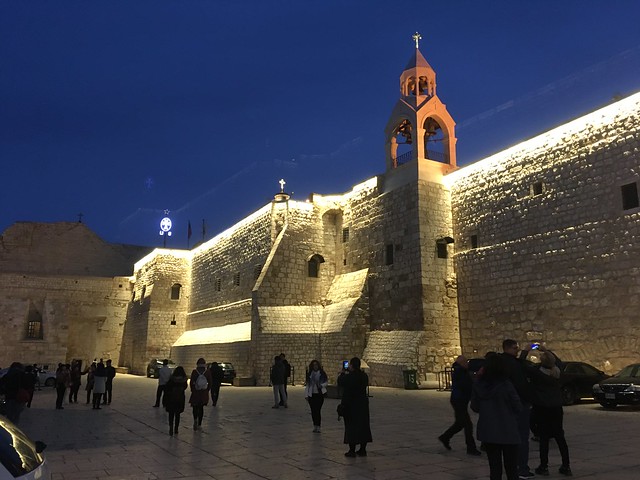
Outside the Church of the Nativity
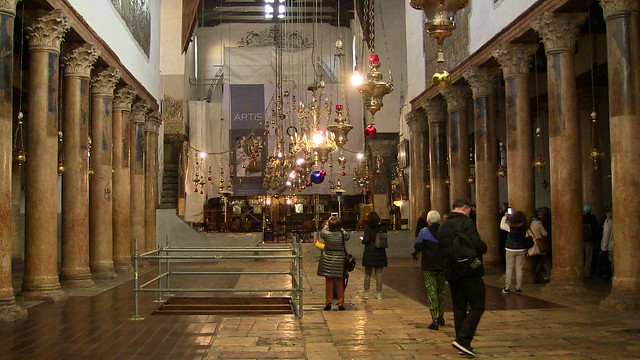
Inside the Church of the Nativity
The Church of the Nativity was built in 327 by the mother of Constantine the Great, St. Helen. On a large pillar within the church we saw a formerly crying icon of Jesus. There, down a narrow, winding below ground staircase lies the birth-spot of Jesus. Underneath the Church is the manger of the nativity, lit only by lanterns. We felt like the shepherds from the nearby villages looking for the King that was born in a nearby manger. The narrow stairs leading into a darkened room lit only by lanterns invoked us to kneel, to bow and to kiss the star on the ground upon which the cradle was placed. This is also the Cave of The Infants, where the bones of the 14,000 infants slaughtered by Herod were found. To culminate our emotional worship, Father George led us in prayer by singing the Greek Orthodox hymn, (I Gennisis Sou Christe O Theos Imon-Your Birth, O Christ our Lord). It brought tears to the pilgrims, as the emotion and sincerity invoked by this communal song of praise, reminded us of Jesus Christ’s presence in our lives.
With faithfulness in our hearts, we departed from Bethlehem by tour bus to the ‘Old City’ in Mount Zion, where the Last Supper, the Palpation of Thomas, as well as the Epiphany of the Holy Spirit took place on the day of Pentecost. Then we walked through the Via Dolorosa, and reached the place where King David was born and died. Subsequently, we visited the Wall of Tears. This structure ‘The Wailing Wall’ is the remaining Western Wall from the second construction of the temple of Solomon. We ended our day’s tour in the garden of Gethsemane, in which are located the Place of The Great Arrest and the Rock of Agony. We celebrated Mass in Gethsemane, at the Basilica of all Nations, where we all gathered around its grand altar, venerated and prayed, as we touched the white rock on which Jesus prayed. We laid our lives aside for a while and focused on our love for Him.
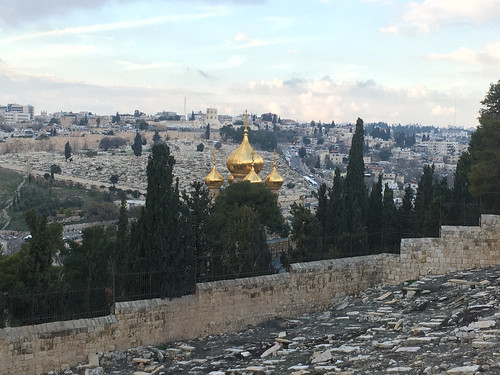 The Mount of Olives
The Mount of Olives
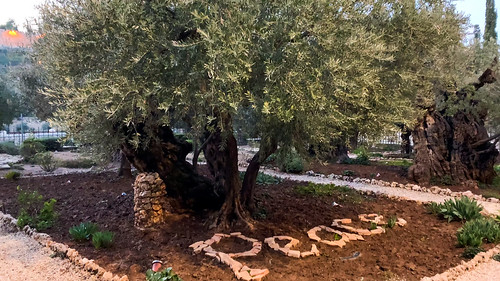
Garden of Gethsemane
At 6:30pm that evening, we returned to Bethlehem to hear Vassula’s presentation. She addressed us, reminding us that our Lord in these times of Mercy is calling his creation to repent, to live a life of unceasing prayer, reconciliation and unity; above all He asks us to attain a closer, intimate relationship with Him: to learn how to know Him and understand Him. As He said in Jeremiah 9: 22-23 : “Let the sage boast no more of his wisdom, nor the valiant of his valor, nor the rich man of his riches; but if anyone wants to boast, let him boast of this: of understanding Me and knowing Me.”
“Christ’s love is so great,” Vassula said, “that we can stand in awe endless hours and days. We ask ourselves, ‘how is it that the Eternal God, leaves His Throne and descends now to talk to us?’ The Lord of lords, the God of all the universe not only takes us into consideration and values us as a valuable treasure, but also shows us how much He cares for us! It becomes unbearable for Him to remain silent. He just couldn’t hold Himself back anymore; and so, His great love compelled Him to rush to us, to remind us of our foundations, to remind us that He is our Savior.”
After reflecting on Vassula’s words, Bishop Riah sorrowfully told us that the Christian population in the Holy Land is only 1.8%. This is a tragedy. Ignorance to the Church breeds indifference. Christians, he said, are no longer considered; they are marginalized. The real brother/sister is the one who’s merciful. Insightfully, Bishop Riah illustrated that there are three aspects of conduct within humanity. Firstly, there are those who say, what is yours, is mine. They kidnap your child, abuse your children, deprive you of life. The second party will say, what is mine, is mine. They will not stop to look at one in need; they are too busy; they are too concerned with their own jobs. (This is the condition of most of today’s world.) The final party will say, what is mine, is yours. If Christ, didn’t espouse this last manner of conduct, we would not be here. He reconciled the world to Himself. Instead of relying on the United Nations to solve the world’s problems, we, as our ministry, should solve them. “Blessed are the peacemakers, not the peace talkers. Let us note that only a few disciples changed the course of human history. Let’s join hands (in prayer) to change the course of human history in this Palestinian place.
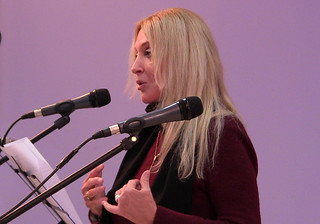
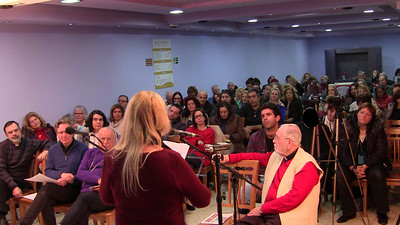
Vassula speaks
Sunday, January 12, our program was that we walk through Jerusalem’s Old City in the Via Dolorosa all the way to the Holy Sepulcher.
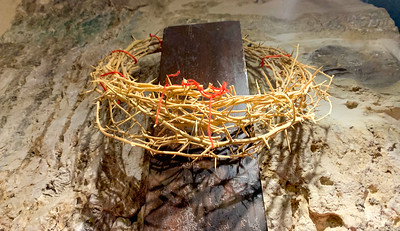
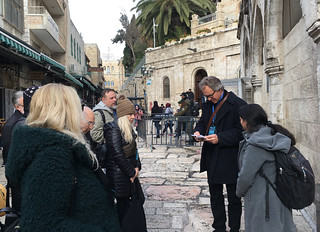
Praying the Stations of the Cross at the Via Dolorosa

Vassula meets with Rabbi Alon Goshen and Father Arsany
On Later, Vassula, along with Rabbi Alon Goshen from Jerusalem Father Arsany from the Coptic Orthodox church met briefly during a tour intermission to share their thoughts, their missions’ nuances, and the spirit towards communal friendship.
Later that day back in Bethlehem we were scheduled to hear Fr. Nicolas’s presentation. Here are some excerpts of his talk: “through our participation in Christ’s Love, we become transfigured like Christ was at Mount Tabor. Divine Wisdom is given to us. Hagia Sophia (‘Holy Wisdom’) can be breathed in, tasted, fragranced, imparted slowly, like unveiling something like a cloud that dissipated.” He claimed that: “we are as butterflies inside a cocoon.” On August 7, 2002 Jesus imparted to Vassula: “I make mine in you; I make myself in you, an immediate in-dwelling…as if grafting a branch;” “The true theology, that is, the rooting of ourselves in the divine plan is contemplation. True Theology is a contemplation of God’s foretaste of beatific vision, an introspection of oneself, in order to surrender to His Will. His reign begins in us,” Fr. Nicolas said. Jesus disclosed to Vassula ‘I will not keep silent; I will keep raising prophets and shine like a lamp where there is darkness;’ (cf. True Life in God, February 12, 2000) “Even in our exhaustion,” he said, “when we see only failure, God is very happy with our efforts towards divine contemplation.” Moreover, Jesus proclaims: ‘I will restore the nations through suffering;’ (cf. True Life in God, February 12, 2000) “Sacrifices are offered from those He has chosen. They may say they have toiled in vain, but they have done what they were told to do. Incidentally, divine power is not earned, but crowned and rewarded in the measure of the love you have given. Praise God with your tongue; bless Him with your eyes; contemplate His wounds.” If you want something from God, pray for someone else. All in all, loyalty, adoration and enlightenment dispel darkness.”
Father Theodoros Kontidis, who spoke next, claimed that the True Life in God Messages are a Sign of God’s touch. With the fact that Christ became man and shared our human nature, we can say that that is no less of a miracle than saying Christ is close to us, as a spouse. He who is the greatest in the heights is the closest entity in our soul. Our Lord is so interested in saving us that He is wounded for our sins and rejoices and yearns for our reply. He asks to make us His own, in His image in mind, heart and actions. The Father tells Vassula: “I want you to become intimate with me; I want you to love me; learn to love me like a child; speak to me with your heart but never forget that I am holy;” Our relationship with our Lord is the beginning of Wisdom: adore Him, worship Him, fear the Lord…speak to Him with intimacy. You will not know God unless you approach Him in an intimate way. Father Theodoros concluded with a story taken from the True Life in God Messages: (13.11.91)

Father Theodoros & Bishop Riah
The Lord said: “I happened to be taking a walk nearby a river when I saw a driftwood, 2 drifting away with the worldly current; I leaned over and picked it out of the stream, I brought it Home with Me and planted it in My Garden of Delights; from a dry piece of wood I made out of you a Tree; I said: “grow! grow and take root in My Garden, in My own Property; and from your blossoms exhale a perfume to appease My Justice;” I said: “crops of fruit shall sprout each month and your leaves will be the cure to many”; now and then I amuse Myself in pruning you; My delight is to see flowers in blossom and a constant growth in your fruit; alone, the Water3 from My Sanctuary4 can give you growth and Life; I, Yahweh, will see to it that you prosper; I take pleasure in picking now and then on My way pieces of driftwood; 5 I can give life to anything I pick on My way;”
Early in the morning, on Monday, January 13, we departed for the Region of Galilee. The distances between our Bethlehem Hotel and our pilgrimage tour areas were vast. We could be reminded that the first apostles endured long-distance travel, mostly by foot.
We then hurried-off to embark on an old-fashioned boat that would sail on the Galilean sea. The view was truly breath-taking, with flocks of seagulls scattered in flight around us, and a transparently serene body of water encompassed around us. However, let us see the Significance of Jesus Walking on Water in John 6:16–21 — The incident involving Jesus walking on water is the fifth of the seven signs recorded in detail by John in John: 2–12. It is set in the evening after the feeding of the 5,000 recorded in John 6:1–15. Like the fourth sign, its timing is significant. Jesus’ encounter with the Jews in Jerusalem recorded in John 5 had raised the following questions: Is Jesus the prophet like Moses (something implied in the argument of John 5:45–47); and is he equal with God? (John 5:18) The disciples knew the Scriptures, and Jesus wanted them to know who he is. It is very significant, therefore, that Jesus is shown to have the power to walk on water, since walking on water is considered in the Old Testament to be uniquely an activity of God. By walking on water, Jesus thus showed himself to be divine, and also greater than Moses. Moses after all had to wait until God made dry land appear before he could lead Israel across the sea at the time of the exodus, whereas Jesus had no such need. Jesus’ divinity can not only be seen in the fact of his walking on water, but also via his “I Am” statement, and through the detail of the immediate arrival of the boat at its destination.
Indeed, Jesus proved Himself to be in command of the elements, something only God can do. He revealed this truth to the disciples who recognized His divinity and responded with a confession of faith in Jesus as God: “The wind died down. Then those who were in the boat worshiped him, saying, ‘Truly you are the Son of God’” (Matthew 14:32–33). This was the first time Jesus was called the Son of God by the disciples, a statement that, in fact, built on what they had said earlier about Him in Matthew 8:27: “What kind of man is this? Even the winds and the waves obey him.” Here they answer their own question: “Truly You are the Son of God!”

The Church of Our Father
Though they had a long way to go in their spiritual understanding, the disciples were growing in their faith in the Lord. Also, this was the first time the disciples are said to have worshiped Jesus. In Matthew 2:11, the magi from the East worshiped Jesus. Later, a leper is said to have worshiped Jesus (Matthew 8:2). A synagogue ruler does the same thing in Matthew 9:18. But this is the first time the disciples worshiped Him. It is also important to note that their worship is joined to their confession (Matthew 14:33). And this is what worship is, acknowledging who God is and praising Him both for who He is and for what He has done. It was in this story that the disciples took the first step and worshiped Jesus as the Son of God.
So here we were, 2020 years later, sailing on the same area where Christ walked on the sea, and where the disciples used to fish! One pilgrim shared with Vassula on her return in Greece, the following: As we were sailing her desire to see Jesus in her was so strong within her that it must have touched Him. He suddenly appeared near the table that was set for Mass, for her alone, where our priests were standing. He was with us! But no one knew…Then she spotted Him on the sea, walking as He did so many years ago! She did not share this with anyone for fear of being disbelieved, but later on she shared it timidly with two people. Where there is innocence and child-like faith Jesus gets infatuated. The rest of us could only envision Christ walking on this very placid, refreshing, life-beckoning water. Our greatest blessing was the gift of the Eucharist, as we celebrated Mass right on the boat! After we disembarked from the old-fashioned boat, we walked on a pier, feeling the water’s breeze comforting our steps. From Galilee we visited the town of Capernaum, where Jesus first preached; then St. Peter’s house, and finally, our day’s excursions took us to the Church of the Beatitudes. The existence of the stone on which Jesus sat to impart His sermon furthered our closeness to Jesus’ presence.

Celebrating the Eucharist on a Boat in the Sea of Galilee
On our last evening in the Holy Land, a dear True Life in God friend, Mezied, who helped organize this pilgrimage with the organizers, shared with us the story of the Saint called Mariam the Little Arab Lily of Palestine. In unison, we received her blessings and a beautiful rosary dipped in holy water that included an image of her.
We were also blessed to have a miracle take place at our hotel. A young girl, wheel-chaired with an inability to open her fisted hands experienced healing. Here is her personalized account:
“From the day I was born, my left wrist was turned inward and sometimes it hurt me. On February 15, 2011, I was operated-on to stabilize my condition, but my poor thumb stayed closed like the rest of the fingers for almost 9 years. Suddenly, as I was on the journey with the True Life in God team in Israel, Father George placed a crucifix with the Relic St. George the Chozebite or Hotzeva between my fingers, and then Vassula placed a crucifix containing a small particle of the original Holy Cross on the same spot and it miraculously opened. The miracle happened, and now my hand opens very easily. I thank God, Vassula and Father George for this wonderful miracle.”
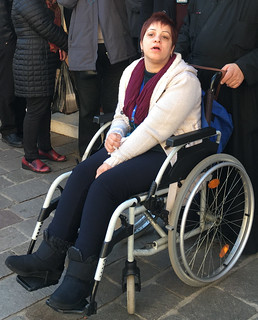
In extension, and as an outcome of our blessed Holy Land pilgrimage, some of our True Life in God readers dropped-off several English and Greek books of Heaven is Real but so is Hell to several people we encountered during these days, as well as to the hotel staff and to our tour guides.
We can remember this pilgrimage through our personally created memories, our excursions, the instructive talks, the healing miracle, our outpouring evangelization efforts, and through a message Vassula received by locution from Jesus right before we departed on January 15th. She said to Him within her: ‘Thank you Jesus for bringing us here in Your homeland.’ And Jesus responded immediately to her saying with surprise: “My homeland? My homeland is in Heaven and so is yours…” Thank you, Jesus!!
Written by True Life in God Pilgrimage attendees: Magdalene, Foteini Perez, Marina Koulouris with the assistance of: Vassula Ryden, Magda Skalova, Lucien Lombard and Georgia Klamson


